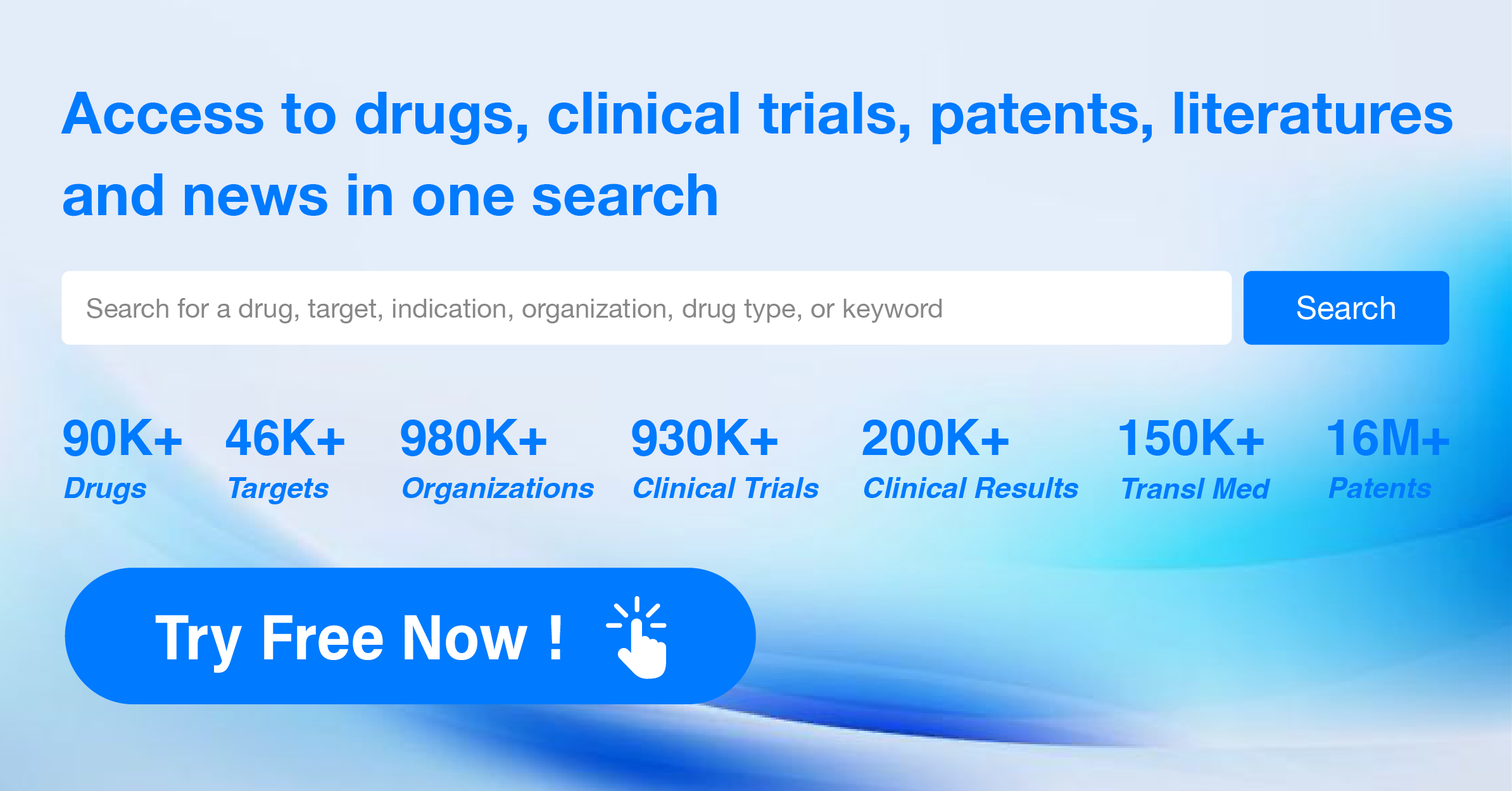Pharma Frontiers: Daily Digest of Global Pharmaceutical News – Jul 5
1.HUTCHMED Brings First-in-Class Anticancer Drug Tazemetostat for Market Approval
On July 4th, the website of the Center for Drug Evaluation (CDE) displayed that HUTCHMED has filed for market approval for Tazemetostat, hydrobromide salt tablets. Previously, the drug was included in the priority review process for the treatment of adult patients with EZH2 mutation-positive, recurrent, or refractory follicular lymphoma (FL) who have previously undergone at least two systemic therapies. Developed by Epizyme, a company under Ipsen, Tazemetostat is a first-of-its-kind global EZH2 methyltransferase inhibitor. It has received accelerated approval from the FDA in January and June 2020 for treating advanced epithelioid sarcoma and certain patients with recurrent/refractory FL, respectively. FL is a subtype of non-Hodgkin lymphoma, accounting for about 17% of non-Hodgkin's lymphomas. In 2020, it was estimated that there were 16,000 new cases of follicular lymphoma in China and 13,000 in the United States. Tazemetostat works by inhibiting EZH2, which leads to the inhibition of H3K27 methylation, restoring the expression of tumor suppressor genes, thus promoting B-cell differentiation or apoptosis, and controlling tumor growth. In 2021, HUTCHMED and Epizyme entered into a strategic partnership, granting HUTCHMED the rights to research, develop, produce, and commercialize Tazemetostat in mainland China, Hong Kong, Macau, and Taiwan. According to the agreement, Epizyme received a$25 million upfront payment, up to $110 million in development and regulatory milestone payments, up to $175 million in sales milestone payments, and additional royalty fees.
2.Salubris Pharmaceuticals' innovative drug, the DPP-4 inhibitor Fotagliptin Benzoate tablets, has been approved for marketing
On July 4th, according to the NMPA official website, Salubris Pharmaceuticals' Class 1 innovative drug, Fotagliptin Benzoate tablets, has been approved for marketing. It is indicated for improved glycemic control in adult patients with type 2 diabetes. Fotagliptin is a dipeptidyl peptidase-4 (DPP-4) inhibitor that inhibits the activity of DPP-4, preventing the breakdown of incretins by DPP-4, thereby increasing the plasma concentrations of the active forms of glucagon-like peptide-1 (GLP-1) and glucose-dependent insulinotropic polypeptide (GIP). This leads to an increase in insulin release in a glucose-dependent manner and a reduction in glucagon levels, lowering blood glucose. Fotagliptin is known for its rapid oral absorption, prolonged half-life, and sustained action.
In a Phase III clinical trial assessing Fotagliptin as monotherapy in newly diagnosed patients with type 2 diabetes, Alogliptin was used as a positive control. The study included a 24-week treatment phase followed by an open-label extension period, totaling 52 weeks. The Fotagliptin group, Alogliptin group, and placebo group enrolled 230, 113, and 115 patients, respectively. Results at 24 weeks showed changes in Hemoglobin A1c (HbA1c) of -0.70%, -0.72%, and -0.26%, respectively. Not only did the Fotagliptin group perform better than the placebo group in the primary endpoint, but its efficacy was also non-inferior to the Alogliptin group. Additionally, the rates of achieving HbA1c less than 7% were 37.0%, 35.5%, and 15.5% in the three groups, respectively. Regarding safety, during the 52-week observation period, the incidence of hypoglycemic events was low in both the Fotagliptin and Alogliptin groups at 1.0% each. No drug-related serious adverse events were observed.
3、3H Pharmaceutical Innovates FGFR2 Inhibitor 3HP-2827 Granted FDA Fast Track Designation
On July 3, 3H Pharmaceutical announced that its self-developed FGFR2 inhibitor, 3HP-2827, has received Fast Track designation from the U.S. FDA for the treatment of patients with cholangiocarcinoma (CCA) harboring FGFR2 mutations. Fibroblast growth factor receptors (FGFRs) genetic alterations are present in various types of human tumors, primarily caused by FGFR gene amplification, mutations, chromosomal translocations, and ligand-dependent activation, leading to abnormal FGFR signaling. FGFR signaling promotes the development of malignant tumors by enhancing tumor cell proliferation, survival, migration, and angiogenesis. According to a 3H Pharmaceutical press release, 3HP-2827 is a highly selective FGFR2 inhibitor developed by the company, capable of specifically inhibiting FGFR2 phosphorylation and thereby blocking the FGFR2 signaling pathway, demonstrating anticancer effects particularly in patients with FGFR2 abnormalities, including those resistant to other treatments. This inhibitor provides a more effective and safer treatment option for patients with FGFR2 abnormalities. Previously, 3HP-2827 was approved for clinical trials in both China and the United States, intended for monotherapy or in combination with chemotherapy and/or immunotherapy for treating patients with FGFR2 abnormalities in tumors. The study is currently recruiting participants. Established in 2021, 3H Pharmaceutical focuses on clinical value, development oriented toward high-selectivity small molecule drugs, highly selective antibody biopharmaceuticals, the exploration of next-generation ADC drugs, and innovative dual-target drug development. The company mainly concentrates on oncology, tumor immunity, and autoimmune fields, aiming to enhance drug selectivity, safety, resistance to drug resistance, and therapeutic windows, thereby providing more effective and safer treatment options and medications for patients.
4.Roche Announces Termination of SKYSCRAPER-06 Study Due to Failure to Meet Primary Endpoint
On July 4th, the official website of Roche announced that its Phase II/III SKYSCRaper-06 study did not meet its primary endpoint and plans to terminate the trial. SKYSCRAPER-06 was a global, Phase II/III, randomized, placebo-controlled, double-blind study designed to evaluate the efficacy of Tiragolumab combined with Tecentriq (atezolizumab) versus Pembrolizumab (pembrolizumab) combined with chemotherapy in first-line treatment of patients with locally advanced inoperable or metastatic non-squamous non-small cell lung cancer (NSCLC). Tiragolumab is a TIGIT monoclonal antibody with a complete Fc region, and Tecentriq is a monoclonal antibody targeting PD-L1. The combination blockade of Tiragolumab and Tecentriq was considered potentially beneficial in overcoming immune suppression and restoring immune response due to the complementary nature of the TIGIT pathway with the PD-L1/PD-1 pathway, potentially enhancing efficacy. However, current data indicates that Tiragolumab combined with Tecentriq and chemotherapy did not significantly outperform the control group in terms of PFS (Progression-Free Survival) and OS (Overall Survival). The specifics are as follows: the HR for PFS was 1.27 (95% CI: 1.02, 1.57). The HR for OS was 1.33 (95% CI: 1.02, 1.73), with OS data still immature. These results suggest that the efficacy of Tiragolumab combined with Tecentriq and chemotherapy is lower than the control group in the ITT (Intention-to-Treat) population. Nevertheless, the overall safety of Tiragolumab combined with Tecentriq and chemotherapy was consistent with previously observed results, with no new or unexpected safety issues detected. However, based on the efficacy data, Roche has decided to terminate the trial.
5.Ausper Biopharma's New Hepatitis B Drug, AHB-137 Injectable, Proposed for Inclusion as a Breakthrough Therapy
On July 3rd, the Center for Drug Evaluation (CDE) of China's National Medical Products Administration announced on its official website that Ausper Biopharma's injectable drug AHB-137 is proposed for inclusion as a breakthrough therapy for the indication of chronic hepatitis B. According to public information from Ausper Biopharma, AHB-137 is an unmodified antisense oligonucleotide (AS yelled) drug that holds the potential to be a cornerstone for the "functional cure" of chronic hepatitis B. According to China's Clinical Trial Registry and Information Announcement Platform, Ausper Biopharma initiated a Phase II clinical trial of AHB-137 injectable for patients with chronic hepatitis B in June of this year. In this study, AHB-137 is administered subcutaneously at a dose of 300mg per injection, once a week. Hepatitis B (HBV) is a significant global health issue. The World Health Organization (WHO) estimates that in 2022, there were 254 million people living with chronic hepatitis B, with an estimated 1.2 million new cases and 1.1 million deaths annually. The clearance of Hepatitis B surface antigen (HBsAg) is considered the optimal treatment endpoint, also known as a "functional cure." However, current treatments rarely achieve this goal, thus highlighting the urgent need for more innovative therapies. Ausper Biopharma is committed to the development of "first-in-class" and "best-in-class" targeted small nucleic acid drugs, focusing on the functional cure of chronic hepatitis B and efficient targeted treatments for liver diseases, and has expanded its research into targeted small nucleic acid therapies for extra-hepatic new targets. In November 2023, Ausper Biopharma announced the completion of a 100 million yuan in Pre A+ round funding. According to Ausper Biopharma, AHB-137 is a non-conjugated antisense oligonucleotide (ASO) targeting a highly conserved sequence at the 3' end of HBV mRNA, having the potential to become a cornerstone of the "functional cure" for chronic hepatitis B.
6.GSK Signs Nearly €1.5 Billion Deal to Develop Potential "Best-in-Class" mRNA Therapies
On July 4th, GSK and CureVac announced that they have restructured their existing collaboration into a new licensing agreement, which will enable both companies to prioritize investment and focus on their respective mRNA development programs. Under this agreement, CureVac will receive payments close to €1.5 billion. Since 2020, GSK and CureCan have been working together to develop mRNA vaccines for infectious diseases. Through this collaboration, GSK and CureVac currently have candidate vaccines for seasonal influenza in Phase 2 clinical trials and candidate vaccines for avian flu in Phase 1 clinical trials. All candidate vaccines are developed using CureVac's second-generation mRNA technology platform. To date, the data related to these candidate vaccines have been positive, demonstrating their potential to become prospective "best-in-class" vaccines. According to the new agreement terms, GSK will be fully responsible for the development and production of these candidate vaccines. GSK will own the global commercialization rights for these vaccines. This agreement represents the latest step in GSK's continuous investment in vaccine platform technologies, aiming to develop the best platforms tailored to each pathogen, for creating potential "best-in-class" vaccines. mRNA is a versatile vaccine technology capable of adapting to rapid viral strain changes, showing potential applications against emerging viruses. GSK continues to develop and optimize its mRNA platform capabilities through investments and collaborations, including AI/machine learning-based sequence optimization and the design and production of nanoparticles. As per the agreement, CureVac will receive a €400 million upfront payment, along with up to €1.05 billion in development, regulatory, and other milestone payments.
7.Amgen Secures Commercialization Rights for Autoimmune Drug in Asia and Other Regions; Application for Marketing Authorization Filed in China
On July 3, Amgen announced that it had reached an agreement with CSL Vifor to acquire the commercialization rights for Avacopan (brand name: Tavneos) in Asia and Latin America, including the mainland Chinese market. Avacopan is an innovative drug designed to treat ANCA-associated vasculitis and has been approved for marketing in several countries globally, with an application already filed in China. Avacopan is an orally administered, selective complement 5a (C5a) receptor inhibitor that works by specifically blocking the C5a receptor on inflammatory cells such as neutrophils, preventing their activation by C5a and thereby reducing inflammatory damage.
Publicly available information indicates that Avacopan was initially discovered and developed by ChemoCentryx, which holds its commercial rights in the United States. In August 2022, Amgen announced a purchase of ChemoCentryx for approximately $3.7 billion. Prior to this, CSL Vifor owned the rights to commercialize Avacopan in markets outside of the United States. Following this collaboration, Amgen will also hold commercialization rights for Avacopan in both Asia and Latin America, including mainland China.
In October 2021, Avacopan was approved by the U.S. FDA for the treatment of adult patients with severe active ANCA-associated vasculitis, specifically granulomatosis with polyangiitis (GPA) and microscopic polyangiitis (MPA), as an adjunctive treatment in combination with a standard therapy regimen, including corticosteroids (Avacopan does not eliminate the use of corticosteroids). At that time, ChemoCentryx's press release noted that this was the FDA’s first approval of an orally administered complement C5a receptor inhibitor.
How to obtain the latest research advancements in the field of biopharmaceuticals?
In the Synapse database, you can keep abreast of the latest research and development advances in drugs, targets, indications, organizations, etc., anywhere and anytime, on a daily or weekly basis. Click on the image below to embark on a brand new journey of drug discovery!




